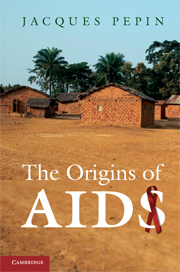Book contents
- Frontmatter
- Contents
- Figures, maps and table
- Acknowledgements
- Abbreviations
- Note on terminology
- Introduction
- 1 Out of Africa
- 2 The source
- 3 The timing
- 4 The cut hunter
- 5 Societies in transition
- 6 The oldest trade
- 7 Injections and the transmission of viruses
- 8 The legacies of colonial medicine I
- 9 The legacies of colonial medicine II
- 10 The other human immunodeficiency viruses
- 11 From the Congo to the Caribbean
- 12 The blood trade
- 13 The globalisation
- 14 Assembling the puzzle
- 15 Epilogue
- References
- Appendix Classification of retroviruses
- Index
5 - Societies in transition
Published online by Cambridge University Press: 05 June 2012
- Frontmatter
- Contents
- Figures, maps and table
- Acknowledgements
- Abbreviations
- Note on terminology
- Introduction
- 1 Out of Africa
- 2 The source
- 3 The timing
- 4 The cut hunter
- 5 Societies in transition
- 6 The oldest trade
- 7 Injections and the transmission of viruses
- 8 The legacies of colonial medicine I
- 9 The legacies of colonial medicine II
- 10 The other human immunodeficiency viruses
- 11 From the Congo to the Caribbean
- 12 The blood trade
- 13 The globalisation
- 14 Assembling the puzzle
- 15 Epilogue
- References
- Appendix Classification of retroviruses
- Index
Summary
This background chapter aims to describe the settings in which the rest of the story took place. Africans understandably resent and reject as arrogant, or at least Eurocentric, historical accounts of their continent which consider the European penetration as the starting point and describe this process as discovery rather than what it really was: a military conquest for the purpose of economic exploitation. However, since the events relevant to the emergence of HIV-1 occurred during the colonial occupation of central Africa, and were facilitated by the profound social and economic changes brought about by colonisation, especially around the pool on the Congo River, we will focus on this period, but after a short detour which will enable us to examine how history confirms the molecular clocks of Chapter 3.
The slave trade and the exportation of infectious diseases to the Americas
The arrival of the Bantus in central Africa is, on the scale of human history, relatively recent, having occurred about 2,000 years ago, when migrants from around Lake Tchad managed to dominate the truly indigenous pygmy populations and for the first time introduced various forms of agriculture. In some areas, organisation was limited to small tribes that occupied geographically limited territories. Elsewhere, kingdoms were established, such as the Kongo kingdom, a loose confederation of tribes which corresponded to parts of current day Congo-Brazzaville, DRC, Angola and Gabon. These societies were not technologically advanced, which made it easy for Europeans to conquer the heartland of Africa once they found solutions to the health problems (mostly malaria) that decimated their early soldiers and settlers, many of whom died within two years of their arrival. But central African people had strong values, beliefs and traditions centred on the extended family, the clan. And there was already a fair amount of trading between ethnic groups within the Congo basin.
- Type
- Chapter
- Information
- The Origins of AIDS , pp. 59 - 83Publisher: Cambridge University PressPrint publication year: 2011



